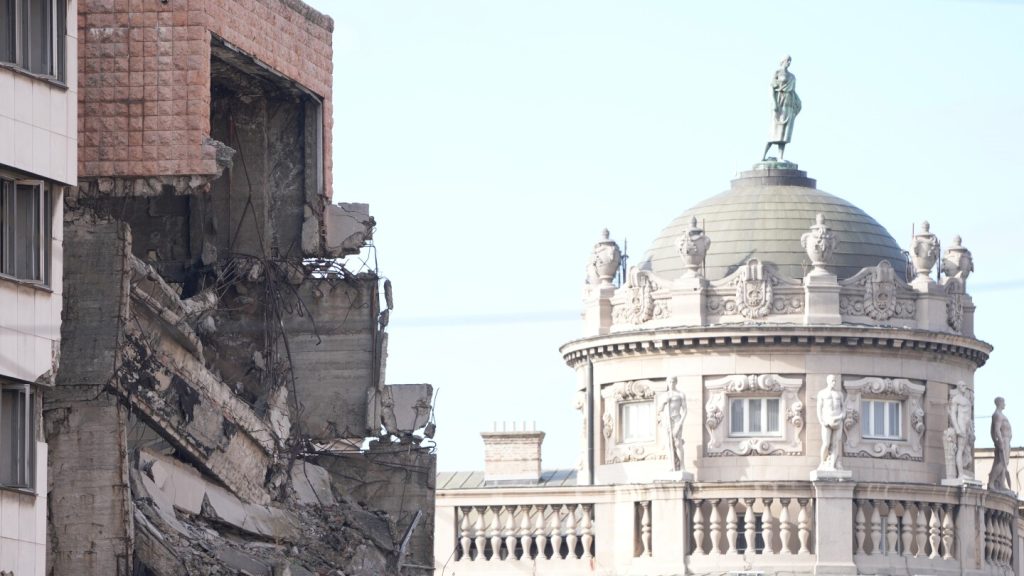Listen to the article
Serbian Parliament Approves Controversial Kushner-Linked Redevelopment Project
Serbian lawmakers have passed a special law that clears the path for a contentious $500 million real estate project financed by an investment company linked to Jared Kushner, former U.S. President Donald Trump’s son-in-law, despite significant public opposition and ongoing legal challenges.
The bill, approved Friday with a 130-40 vote in the 250-member parliament, enables redevelopment of a landmark military complex in central Belgrade that was partially destroyed during NATO’s 1999 bombing campaign. The planned luxury compound would include a high-rise hotel, offices, shops, and apartment buildings.
The approval follows days of heated parliamentary debate and street protests. Hundreds of demonstrators gathered outside the parliament building earlier this week, carrying banners reading “Culture is not for sale, we will not give up the general staff building.”
Serbia’s government under President Aleksandar Vucic last year stripped the complex of its protected heritage status and signed a 99-year lease agreement with Kushner-related Affinity Global Development. However, the project stalled after Serbia’s organized crime prosecutors launched an investigation into allegations that documents used to remove the protected status were forged.
The special legislation, known as Lex Specialis, allows authorities to bypass these legal hurdles and proceed with the site’s development, including demolition of what remains of two sprawling buildings widely considered prime examples of mid-20th century Yugoslav architecture.
“We are demolishing the ruins in order to build,” stated Milenko Jovanov, a lawmaker from Vucic’s populist Serbian Progressive Party, defending the project during parliamentary discussions.
Critics argue the law undermines Serbia’s legal system and disregards the building’s significant architectural and symbolic value. The complex represents a symbol of resistance to the 1999 NATO bombing campaign, which many Serbs still view as an unjustified “aggression.”
Transparency Serbia, a corruption watchdog, has warned that the law “represents a combination of the two most dangerous forms of corruption — the legalization of law violations and the tailoring of general rules to fit hidden interests in one specific case.”
Zdravko Ponos, former Serbian army commander-in-chief and now an opposition party leader, criticized the governing party during debate, saying, “You will demolish something that is a symbol for this nation. With the agreement you signed with the most important son-in-law on the planet, you have obliged to tear this down at the cost of Serbia’s taxpayers.”
President Vucic has characterized the ongoing judicial investigation as an attempt from abroad to “prevent Serbia from establishing better relations with the Trump administration,” framing the project as an opportunity to boost both economic development and ties with the U.S.
According to government officials, Kushner’s company has committed to building a memorial complex within the site dedicated to victims of the NATO bombing campaign, which lasted 78 days and aimed to force then-President Slobodan Milosevic to end his crackdown on separatist ethnic Albanians in Kosovo.
The controversial redevelopment comes amid political challenges for Vucic, who has faced youth-led protests over the past year accusing his government of corruption in state projects. These demonstrations intensified after a concrete canopy collapsed at a train station in Novi Sad following renovation, killing 16 people. Tens of thousands marked the tragedy’s anniversary on November 1.
This isn’t the only Kushner-linked development in the Balkans. Earlier this year, neighboring Albania approved a $1.6 billion plan from Kushner’s company to transform a communist-era fortified island on the Adriatic coast into a luxury resort.
As Serbia continues to navigate complex relationships with both East and West, the project highlights the intersection of international investment, political connections, and questions about heritage preservation in a country still processing its recent history.
Fact Checker
Verify the accuracy of this article using The Disinformation Commission analysis and real-time sources.




10 Comments
This seems like a questionable deal, stripping protected heritage status to enable a luxury development. I hope there are robust safeguards to protect the public interest.
The public opposition is understandable. Large-scale redevelopment projects can disrupt local communities. Inclusive planning and compromise are needed to address all stakeholder concerns.
Well said. Balancing economic and cultural interests is always a challenge. Transparent decision-making and public input will be crucial here.
Curious to see how this plays out. Real estate deals with political connections often raise concerns around cronyism and lack of accountability. Oversight will be critical.
I wonder if there were any environmental impact assessments done for this project. Developments of this scale can have significant effects on the local ecosystem.
Good point. Responsible development should consider the environmental implications, not just the economic ones. Thorough impact studies are essential.
Interesting development. I wonder how this project will impact the local community and historical preservation efforts. Transparency and public input will be key.
This seems like a politically-charged issue. I hope Serbia can find a solution that upholds the rule of law, respects public opinion, and advances the national interest.
Agreed. Navigating the competing interests here will require careful, impartial governance. The public deserves transparency and accountability.
This is a complex issue – economic development vs. cultural preservation. I hope Serbia can find a balanced approach that benefits the community and respects history.